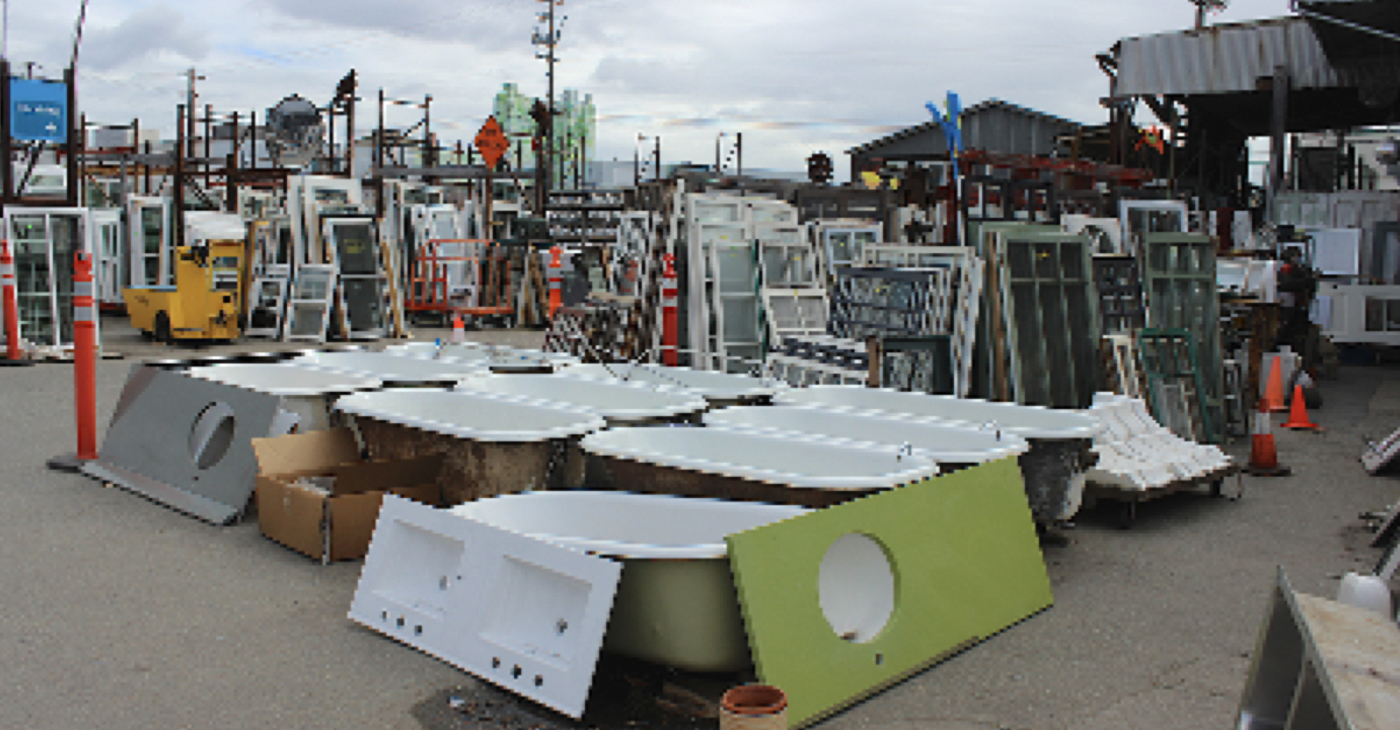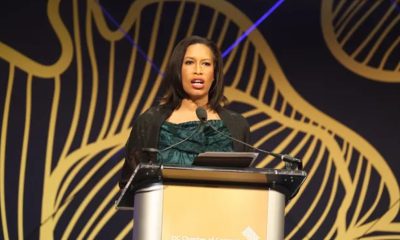Bay Area
Unsatisfied with Wages, Working Conditions, Urban Ore Workers Try to Unionize
Workers at Berkeley’s popular salvaged goods store, Urban Ore, filed a petition to the National Labor Relations Board (NLRB) stating their intention to form a union through the Industrial Workers of the World (IWW) on February 2.

By Zack Haber
Workers at Berkeley’s popular salvaged goods store, Urban Ore, filed a petition to the National Labor Relations Board (NLRB) stating their intention to form a union through the Industrial Workers of the World (IWW) on February 2.
That same day, an Instagram account associated with the union drive posted a statement voicing support for the store and its mission of stopping waste while also pushing for higher wages and scheduling reform for workers.
“We are proud to work at Urban Ore, and we want to make it even better,” reads the statement. “Urban Ore allows its customers a more sustainable alternative for shopping, and we want it to provide more sustainable jobs.”
On February 5, workers held a rally to support their union drive outside of the store. Members of East Bay DSA and several unions, such as ILWU, Bay Area TANC, and the National Union of Health Care Workers, accompanied the workers.
The NLRB will soon hold a secret ballot election for the store’s 25 union eligible employees. If a majority votes to approve the union, it will be officially recognized.
Benno Giammarinaro, who works in Urban Ore’s merchandise receiving department, said he’s “definitely optimistic” employees will secure enough ‘yes’ votes to unionize. As part of their union petition filing, a majority of the store’s employees have already submitted signed cards indicating a desire to form a union.
Mary Van Deventer told this reporter that she and fellow Urban Ore co-owner Dan Knapp would not do an interview. She did, however, e-mail a written statement from the store saying it “respects the rights of its employees to unionize if that is what a majority desire.”
Van Deventer’s statement also said the company offers “very competitive pay.” Urban Ore pays its non-managerial staff a base wage of $13.60 an hour, which is less than Berkeley’s minimum wage of $16.99. But these employees also get fluctuating additional wages as a portion of the store’s gross income goes to them.
In January, this proportion was raised from 10% to 15%. This year the owners estimate the income share to provide a $9.25 boost to the base wage, meaning that, in total, they expect workers to make around $22.85 per hour.
Urban Ore worker Sarah Mossler said that she’s not against income-sharing, but that the current model often leaves her worried about whether or not she can pay her bills.
“I’d be fine with it if we had a stable, minimum living base wage,” said Mossler. “But it’s been incredibly stressful for me because my rent is the same every month while my paychecks aren’t.”
The owners describe the income-share as an “incentive” for workers, but Giammarinaro thinks the current model “puts the risk of the business on the workers,” as factors beyond their control, such as the weather, affect sales.
“If there’s a rainy week,” he said, “merchandise gets damaged, and people don’t come out as much. This means we make several dollars an hour less than usual.”
Ultimately workers feel that their paychecks, even with income-sharing, make living in the Bay Area difficult, and that the wage rate has contributed to high employee turnover.
“We are struggling to afford living in the community that we love,” reads the Urban Ore worker statement on Instagram. “This has created a chronic understaffing problem.”
According to Giammarinaro, 19 Urban Ore employees have left since he first started working there in May of 2021. Currently, the store has 31 workers employed below the senior management level.
Giammarinaro feels the company is in a good position to raise wages to address the turnover as sales have surged since COVID started. The store, which sells mostly donated goods like doors, furniture, appliances and media, has taken in about $7 million in the last two years.
In a letter that Operations Manager Max Wechsler sent to employees this year announcing the income-share percentage rate increase, he stated that, except for its mortgage, Urban Ore is “debt-free.”
Both owners and workers agree that working at Urban Ore is physically demanding. In their statement, the owners describe the jobs as “physical work for all staff,” and that “three tons of goods” enter the store each day.
For most workers, this means lots of lifting. Giammarinaro often finds himself exhausted, saying “almost every day I immediately come home and plop on my bed after work.” Mossler thinks addressing understaffing would make doing such lifting safer.
“When you’re lifting something designed for lots of people to lift,” she said, “and you’re on your own, it’s dangerous.”
Giammarinaro and Mossler both said that in addition to addressing wages and understaffing, they want a union in order to have a say in how the business is run. Recently, Mossler decided to step down from a position in management she had been promoted to in order to be eligible to be a part of a potential Urban Ore union.
While she had taken the management position with the goal of influencing the business and helping co-workers, she didn’t find that method effective.
“I took the job as a manager because I thought that was the way to make the place better and advocate for the people I work with,” she said, “but I quickly saw that I just got more facetime with people that didn’t hear my ideas or take them seriously.”
According to Giammarinaro, one thing workers specifically want is time set aside for cleaning the store. Currently, all in-store cleaning has to be done during business hours, which makes it difficult to maintain the store.
“People could really clean, organize merchandise, and make things look nice if the store could close early once every few weeks, or if people could come in a bit early sometimes,” he said.
In recent years, workers have objected to the manner in which Urban Ore has terminated certain employees. Last summer, 15 workers signed a statement which called for a terminated worker to be rehired. The letter stated the worker had faced “mistreatment” and that their absence would “have a significant impact on revenue, workloads and organizing.”
While that employee was never rehired, workers, like Mossler, want a ‘just cause’ clause in their contract to make it so owners have to give a reason for terminating an employee in the future. Currently, Urban Ore, like all California businesses that don’t have contracts requiring otherwise, can terminate employees “at-will” without giving a reason.
“We think that the at-will employment can rear its ugly head,” said Mossler.
In their e-mail, Urban Ore’s owners stated that this year they are “working toward transitioning to become a worker-owned cooperative,” a transition they have spoken about in the press since 2017.
According to Giammarinaro, workers support such an idea but want to have a voice, through a union, in how a potential cooperative could be structured.
“We agree with a worker-owned cooperative model and thinking unionizing first will help,” he said. “We don’t think we need a coop to start making workplace democracy.”
Activism
OP-ED: AB 1349 Puts Corporate Power Over Community
Since Ticketmaster and Live Nation merged in 2010, ticket prices have jumped more than 150 percent. Activities that once fit a family’s budget now take significant disposable income that most working families simply don’t have. The problem is compounded by a system that has tilted access toward the wealthy and white-collar workers. If you have a fancy credit card, you get “presale access,” and if you work in an office instead of a warehouse, you might be able to wait in an online queue to buy a ticket. Access now means privilege.

By Bishop Joseph Simmons, Senior Pastor, Greater St. Paul Baptist Church, Oakland
As a pastor, I believe in the power that a sense of community can have on improving people’s lives. Live events are one of the few places where people from different backgrounds and ages can share the same space and experience – where construction workers sit next to lawyers at a concert, and teenagers enjoy a basketball game with their grandparents. Yet, over the past decade, I’ve witnessed these experiences – the concerts, games, and cultural events where we gather – become increasingly unaffordable, and it is a shame.
These moments of connection matter as they form part of the fabric that holds communities together. But that fabric is fraying because of Ticketmaster/Live Nation’s unchecked control over access to live events. Unfortunately, AB 1349 would only further entrench their corporate power over our spaces.
Since Ticketmaster and Live Nation merged in 2010, ticket prices have jumped more than 150 percent. Activities that once fit a family’s budget now take significant disposable income that most working families simply don’t have. The problem is compounded by a system that has tilted access toward the wealthy and white-collar workers. If you have a fancy credit card, you get “presale access,” and if you work in an office instead of a warehouse, you might be able to wait in an online queue to buy a ticket. Access now means privilege.
Power over live events is concentrated in a single corporate entity, and this regime operates without transparency or accountability – much like a dictator. Ticketmaster controls 80 percent of first-sale tickets and nearly a third of resale tickets, but they still want more. More power, more control for Ticketmaster means higher prices and less access for consumers. It’s the agenda they are pushing nationally, with the help of former Trump political operatives, who are quietly trying to undo the antitrust lawsuit launched against Ticketmaster/Live Nation under President Biden’s DOJ.
That’s why I’m deeply concerned about AB 1349 in its current form. Rather than reining in Ticketmaster’s power, the bill risks strengthening it, aligning with Trump. AB 1349 gives Ticketmaster the ability to control a consumer’s ticket forever by granting Ticketmaster’s regime new powers in state law to prevent consumers from reselling or giving away their tickets. It also creates new pathways for Ticketmaster to discriminate and retaliate against consumers who choose to shop around for the best service and fees on resale platforms that aren’t yet controlled by Ticketmaster. These provisions are anti-consumer and anti-democratic.
California has an opportunity to stand with consumers, to demand transparency, and to restore genuine competition in this industry. But that requires legislation developed with input from the community and faith leaders, not proposals backed by the very company causing the harm.
Will our laws reflect fairness, inclusion, and accountability? Or will we let corporate interests tighten their grip on spaces that should belong to everyone? I, for one, support the former and encourage the California Legislature to reject AB 1349 outright or amend it to remove any provisions that expand Ticketmaster’s control. I also urge community members to contact their representatives and advocate for accessible, inclusive live events for all Californians. Let’s work together to ensure these gathering spaces remain open and welcoming to everyone, regardless of income or background.
Activism
Oakland Post: Week of December 31, 2025 – January 6, 2026
The printed Weekly Edition of the Oakland Post: Week of – December 31, 2025 – January 6, 2026

To enlarge your view of this issue, use the slider, magnifying glass icon or full page icon in the lower right corner of the browser window.
Activism
Big God Ministry Gives Away Toys in Marin City
Pastor Hall also gave a message of encouragement to the crowd, thanking Jesus for the “best year of their lives.” He asked each of the children what they wanted to be when they grow up.

By Godfrey Lee
Big God Ministries, pastored by David Hall, gave toys to the children in Marin City on Monday, Dec. 15, on the lawn near the corner of Drake Avenue and Donahue Street.
Pastor Hall also gave a message of encouragement to the crowd, thanking Jesus for the “best year of their lives.” He asked each of the children what they wanted to be when they grew up.
Around 75 parents and children were there to receive the presents, which consisted mainly of Gideon Bibles, Cat in the Hat pillows, Barbie dolls, Tonka trucks, and Lego building sets.
A half dozen volunteers from the Big God Ministry, including Donnie Roary, helped to set up the tables for the toy giveaway. The worship music was sung by Ruby Friedman, Keri Carpenter, and Jake Monaghan, who also played the accordion.
Big God Ministries meets on Sundays at 10 a.m. at the Mill Valley Community Center, 180 Camino Alto, Mill Valley, CA Their phone number is (415) 797-2567.
-

 Activism4 weeks ago
Activism4 weeks agoDesmond Gumbs — Visionary Founder, Mentor, and Builder of Opportunity
-

 Activism4 weeks ago
Activism4 weeks agoFamilies Across the U.S. Are Facing an ‘Affordability Crisis,’ Says United Way Bay Area
-

 Alameda County4 weeks ago
Alameda County4 weeks agoOakland Council Expands Citywide Security Cameras Despite Major Opposition
-

 Alameda County4 weeks ago
Alameda County4 weeks agoBling It On: Holiday Lights Brighten Dark Nights All Around the Bay
-

 Activism4 weeks ago
Activism4 weeks agoBlack Arts Movement Business District Named New Cultural District in California
-

 Activism4 weeks ago
Activism4 weeks agoLu Lu’s House is Not Just Toying Around with the Community
-

 Activism4 weeks ago
Activism4 weeks agoOakland Post: Week of December 17 – 23, 2025
-

 Black History3 weeks ago
Black History3 weeks agoAlfred Cralle: Inventor of the Ice Cream Scoop
















































